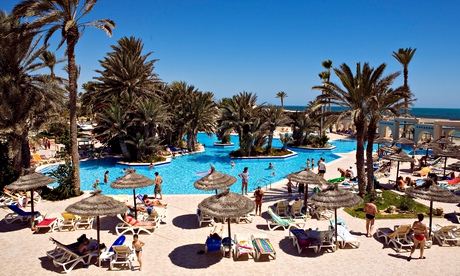
Nervous or money-conscious tourists have made the all-inclusive holiday one of tourism's biggest growth areas. The popularity of trips for which everything is laid on and paid for upfront is rising fast, with demand up by a third in the past decade and the major tour operators adding more and more all-inclusive options to their programmes.
A report from the UK charity Tourism Concern to be published this month will add to fears that the trend is hurting the local people in all-inclusive resort areas who depend on tourism for their livelihoods. Research looking at all-inclusive hotels in Tenerife, Kenya and Barbados found that hotel staff had worse working conditions and labour rights and were subjected to more stress and longer hours than those in other hotels.
One of the reasons cited was that self-sufficient resorts have such tight margins, with so little paid for each room that little is left with which to pay those at the bottom of the supply chain – the hotel workers. Staff at all-inclusive hotels were shown to receive significantly less in tips, a perk on which they are often heavily reliant. Because guests stay in the compound, working hours were longer and more stressful.
Mark Watson, head of Tourism Concern, said the all-inclusive industry was "stifling businesses outside the enclave and very few benefits are reaching local communities. We are getting reports of tourists being told that their insurance doesn't cover them if they leave their hotel grounds and sometimes people will barely know where they are, paying to just sit by a pool in the sunshine."
Industry experts say that the rising popularity of the all-inclusive holiday is down to the budget convenience of paying one price for everything upfront, along with the extra security of being insulated from having to navigate a foreign environment.
Last year, according to research by TravelSupermarket, the online comparison website, more than one in 10 British holidaymakers went on an all-inclusive trip for their main holiday – one third of all package holidays sold. One large holiday company, First Choice, now sells only all-inclusive breaks.
However, this latest report from the ethical tourism charity comes amid other research which suggests that communities suffer from the ringfencing that happens in all-inclusive resorts.
Complete with their own bars, restaurants and entertainment venues, the resorts leave guests with little or no incentive to go anywhere else, whether to eat in local restaurants, visit locally owned nightspots or gift shops or pay entry fees to local attractions or hire local guides or drivers. The tour companies – few of which are owned locally – pocket most of the spending money.
Tourists also use vast quantities of resources – energy and water in particular – and create significantly more waste than local people.
Tourism Concern agreed that the resorts bring in jobs, albeit low-paid, short-contract ones that afforded little security. A study by the Travel Foundation, an organisation promoting ethical tourism, said that the average all-inclusive clients ate outside their hotel only once, and one in four all-inclusive customers spent less than they expected – suggesting they could have spent more if persuaded. Fewer than one in 10 holidaymakers on non-all-inclusive breaks spent less than £5 a night outside their hotel. In all, only 13% of holidaymakers stayed exclusively in their resort.
A previous study by the group into a four-star, all-inclusive resort in Turkey in 2011 found that the local economy benefited relatively little from the hotel's economic activity, with less than a tenth of the tourists' spending boosting the regional economy.

